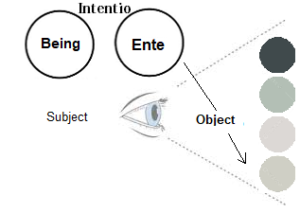
Arquivo para October 14th, 2024
Noetics, Ontologie and War
For Plato, noesis is superior to dianoia, which is discursive and apparently logical, while the former is a high possible mental activity, inhabiting the sphere of Good and Harmony.
is discursive and apparently logical, while the former is a high possible mental activity, inhabiting the sphere of Good and Harmony.
It is a possibility of access to the “divine” world (Plato’s highest good which is in the eidos), it is transcendent, absolute, beyond ordinary human reasoning, philosophers pursue it without even touching on the question of the belief in a higher God where noesis “dwells”, it is not Being, but a mental attitude.
Dianoia, on the other hand, while it inhabits logical, mathematical and technical reasoning, is attached to what the mind can grasp of the earthly world, even though it admits to mistakes, truths that are not absolute and sometimes confusing, they inhabit the daily life of the human being, who is also disconnected from Being.
There is a foundational line that goes from phenomenology to the anthropotechnics of Peter Sloterdijk and Byung-Chul Han, essentially involving the question of Being, the link between noesis and noema, weakened by the bombardment of narratives that the digital universe has provided, but the forgetting of being, the absence of interiority have led to what Chul-Han calls “deauritization” and “pure facticity”:
“The disenchantment of the world expresses itself as de-auritization. Aura is the radiance that elevates the world beyond its pure facticity, the mysterious veil that envelops things” (Han, 2023, p. 80).
It’s not a question of denying facticity, but of not allowing its noesis, that is, the initial comprehension in the mind in all its aura, it makes a “narrative selection”, in the words of Byung-Chul (talking about photography): “It extends or shortens the temporal distance. It skips years or decades. Narrativity is opposed to chronological facticity” (Han, 2023, p. 81).
These are the lies of wars, of all wars because they hide their real motives, but particularly of current wars because they use narratives to change what is evident if read in chronological facticity, in a very current example, last week’s bombing of a hospital for the elderly in Ukraine (photo) and the bombing of UN bases in Lebanon, this correlates with cruelty and the absence of any narration to justify them.
Peace lies in the hearts and authorities that maintain the aura of hope, the spirit of solidarity.
Han, Byung-Chul. (2023) A crise da narração. Transl. Daniel Guilhermino. Brazil, Petrópolis: Vozes.
Heidegger and the affective tone
Intentionality is inherent to Being, it is a manifestation of interiority.
manifestation of interiority.
As a good orientalist, although based in Germany, Byung-Chul Han’s analysis does not start from the objectivist, materialist or substantialist perspective of the classic authors of Western philosophy, but from the holistic perspective of what he calls “affective tonality” in Heidegger.
To understand this different form of ascesis, contrary to the distance from the object that idealism proposes, the affective tonality “possesses an a priori anteriority that is not, however, attributable to the transcendental capacity of the subject, a pre-vision that sees before the object be outlined” (page 58).
Understanding objects as “beings”, “letting entities be, which is an attunement, penetrates and precedes all behavior that remains open and develops” and “the opening of entities in their totality does not coincide with the sum of currently known entities” (pg. 58), so any rationalist analysis is fragmentary and does not “see” the entities.
And furthermore, the “in the midst of beings in totality” is not verified by any reflection, so the thematization itself, “which always proposes an original scenario” is already an interpretation (pg. 59).
The affective tonality opens the space of there, according to Han, “which floods consciousness and which must be given in advance so that it can begin its thematizing work and discourse, and concludes with a quote from Heidegger: “Consciousness is only possible on the foundation of there as a derivative mode of it”.
Thus “the a priori event already presupposes an interpretation, and this temporal difference, which is placed before the interval of countable time, remains constitutive for the difference between being and being” (pg. 59), which is why ontologically the difference exists and not the idealistic separation as idealism supposes.
Thus, true ascesis is not a separation of the world (objective and subjective), but in the world through the difference between being and being, only a divided ascension (through death) can definitively separate being from being, thus we are in the relationship of an “affective tone ”.
Han, B.C. (2023) Coração de Heidegger: sobre o conceito de tonalidade afetiva em Martin Heidegger (Heidegger’s heart: on the concept of affective tonality in Martin Heidegger). Transl.Rafael Rodrigues Garcia, Milton Camargo Mota. Brazil, Petrópolis: Vozes.

